What you need to know
Page 53

If you've noticed an error in this article please click here to report it so we can fix it.
The new UK regulations will: • Allow a four-month reference period for calculating the average 48-hour week, which can be extended to six months • Allow night workers to work more than 10 hours work in every 24-hour period. To take advantage of the changes, there will need to be either a collective agreement, or a workforce agreement at company level between the employer and employees. In addition, mobile workers will still be subject to the limits under the EU drivers' hours rules • Define "night time" as a period between midnight and 4am for the drivers and crews of heavy goods vehicles • Empower VOSA (or the Driver and Vehicle Testing Agency in Northern Ireland) to enforce the new regulations, primarily in response to complaints they receive. Their approach will be to educate employers and workers rather than seeking to prosecute. But where evidence exists that the rules are being systematically broken, examiners will check working time records at an employer's premises. Work time records must be kept by employers for two years In addition, government officials confirm that: • Self-employed drivers will not be covered by UK regulations until 23 March 2009 • Voluntary work will not contribute towards the working time of mobile workers under the new regulations • Workers who are occasionally subject to the directive will be covered by the provisions of the directive, including the 60-hour weekly limit, the 10-hour limit on night work, the daily/weekly rest requirement and the break requirements • Companies have the choice (providing they have a collective or workforce agreement in place), to decide which method they want to use for calculating the average 48-hour week. They can either use a rolling reference period (used under existing working time regulations), or use one of the options for fixing the reference period as outlined in the consultation document • Detailed guidance on the new legislation including definitions (notably working time and periods of availability) and occasional drivers and mobile workers will be published in due course"


























































































































































































